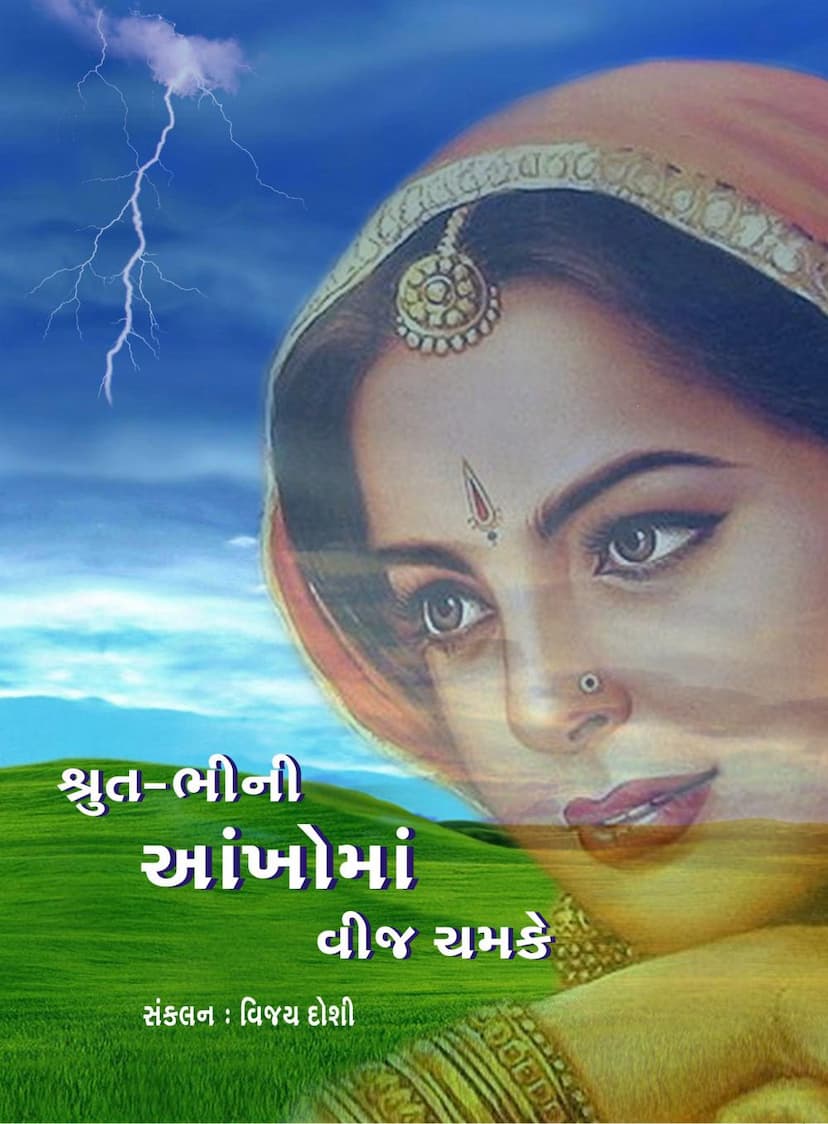Shrut Bhini Aankho Ma Vij Chamke
Added to library: September 2, 2025

Summary
Here's a comprehensive summary of the Jain text "Shrut Bhini Aankho ma Vij Chamke" by Vijay Doshi, based on the provided pages:
Book Title: Shrut Bhini Aankho ma Vij Chamke (In Eyes Moistened by Shrut, Lightning Flashes) Author: Vijay Doshi Publisher: Satrang Media and Publication Pvt Ltd
Core Theme:
The title itself, "Shrut Bhini Aankho ma Vij Chamke," encapsulates the book's central theme. It signifies the profound experience of spiritual awakening and insight (lightning flash) that occurs in the eyes of a seeker when they delve into and internalize the profound teachings (Shrut) of Jainism, leading to tears of spiritual emotion. The book is a compilation of thoughts, reflections, and teachings aimed at guiding readers towards self-realization and spiritual upliftment within the framework of Jain philosophy.
Author's Vision and Dedication:
Vijay Doshi, based in Charlotte, North Carolina, USA, presents this compilation as a debt of gratitude to his parents, who instilled religious values and inspired him to strive for spiritual elevation. His email and postal address suggest a strong connection to the Jain community in the USA and a desire to share these spiritual insights.
Content Overview (Based on the provided Table of Contents and key sections):
The book is structured into various sections, each exploring different facets of Jainism and spirituality. Based on the provided page snippets, the content covers a wide range of topics:
-
Glimpses into Jain Philosophy and Practice: The book delves into the core principles of Jainism, likely explaining concepts like:
- Jain Shasan: The glory and essence of the Jain teachings ("Jainam Jayati Shasanam").
- Navkar Mahamantra: Its eternal significance and role in spiritual progress.
- Aart of Living: Principles for a virtuous life.
- Karma Theory: Discussing karma prevention (Karma Nivaran), the scientific basis of Jain practices (Karma Nidra, Karma Vac), and the "Karma Computer" concept.
- Pancha Samvay: Exploring the five causes that contribute to any event or action, emphasizing the role of Purusharth (self-effort).
- Jain Kriya & Science: Explaining the scientific rationale behind Jain rituals and principles like "Jayana" (careful conduct to avoid harm) and compassion towards living beings.
- Dharmayatra: The journey towards spiritual well-being and eventual liberation (Moksha).
- Devotion and Reverence: Expressing respect for Arihants, Siddhas, Gurus, and the Dharma.
- The Nature of the Soul: Exploring the soul's inherent purity and potential for liberation.
- Vairagya (Detachment): The importance of detachment from worldly pleasures and possessions.
- Equanimity: The practice of maintaining a balanced state of mind amidst dualities.
- The Role of the Mind: Understanding the mind's influence on spiritual progress and the path to "Mano Vijay" (conquering the mind).
-
Spiritual Insights and Reflections: The book includes:
- "Shrut Bhini Aankho ma Vij Chamke": The compilation itself, reflecting the author's personal spiritual journey.
- "Anupreksha": Contemplations and introspective thoughts on spiritual truths.
- "Shraddhan": A recurring theme or pen name, signifying deep faith and devotion. The author likely shares personal spiritual experiences and insights under this theme.
- "Aatma No Vikas Kram": The path of soul's evolution, progressing through various stages (gunasthanas).
- "Moksha Nu Swarup": Explaining the nature of liberation and the path to achieve it.
- "Karm Bandh": Detailed discussions on how actions lead to karmic bondage and the mechanisms of "Aashrav" (influx of karma) and "Anubandh" (connection/continuity of karma).
-
Philosophical and Scriptural References: The book draws heavily from Jain scriptures and the teachings of revered saints and scholars, indicated by the "References" section. This includes references to:
- Shrimad Vijay Ranchodsurishwarji Maharaj: Mentioned for his profound teachings.
- Shri Harishbhadra Vijayji Maharaj: His insights are likely central to the spiritual journey.
- Various Sutras: Tattvarthadhigam Sutra, Uttaradhyayan Sutra, Bhagvati Sutra, and others are referenced, suggesting a deep dive into Jain scriptural knowledge.
- Panditvaray Shri Panalal J. Gandhi, Pu. Dhirubhai Pandit, Babubhai Sanghvi Kadiwala: Likely scholars or personalities whose works are referenced.
- Jain Literature: The book aims to make complex Jain philosophical concepts accessible through compilations of writings from knowledgeable individuals.
-
Emphasis on Practical Spirituality: The content touches upon practical aspects of spiritual practice, such as:
- Importance of Understanding: The need to understand the true nature of things, the soul, and the universe.
- Self-Discipline: The role of practices like "Samayik" (meditation/equanimity practice), "Pratikraman" (atonement), "Pausadh" (fasting), and adherence to vows in spiritual progress.
- Mind Control: The significance of managing one's mind, desires, and senses to achieve spiritual goals.
- Ethical Conduct: The emphasis on "Jayan" (careful conduct) and compassion for all living beings.
- The Role of Faith: The fundamental importance of "Shraddha" (faith) in the path to spiritual realization.
-
Structure and Presentation: The book is divided into multiple sections and contains verses, poems ("stavans"), and reflections. The author aims to present spiritual concepts in a way that resonates with the reader's heart and mind. The inclusion of references to various scriptural texts suggests a scholarly yet devotional approach. The author expresses hope that this compilation will serve as a guide for spiritual seekers and foster positive spiritual connections.
Overall Purpose:
"Shrut Bhini Aankho ma Vij Chamke" appears to be a spiritual guide that aims to illuminate the path of Jain dharma. It seeks to deepen the reader's understanding of Jain philosophy, encourage spiritual practices, and ultimately lead them towards self-realization and a life of virtue and peace, following the path shown by the Tirthankaras. The book is presented with a sense of gratitude, humility, and a desire to share spiritual wealth.